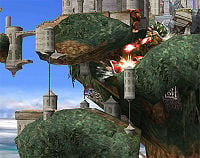
A cave of life is an unofficial term for an enclosed area in a stage where characters can survive to much higher percentages than usual. These areas have an impassable platform above the area, and can contain other walls, which allows characters to tech and survive potentially fatal blows. Even without teching, characters will bounce off the ceiling, which absorbs some of the knockback, and allows the character to survive longer than usual.
Caves of life are considered a degenerative aspect of a stage for competitive play. Besides allowing characters to survive attacks well beyond what is usually possible, they often provide powerful camping positions due to their enclosed nature and the difficulty of KOing characters within them, and they produce an overcentralisation on teching. As such, most stages with them are universally banned from tournaments, and stages with more minor caves of life are rarely legal.
Examples
These are the stages in the Super Smash Bros. series that contain caves of life.
Brinstar Depths
The stage provides rather minor caves of life that are caused by two floating, moderately sized platforms that are impassable. However, both are temporary due to the frequent rotating of the stage, and they do not have as large of an effect that other caves of life do.
The Great Cave Offensive
True caves of life are present in the lower-right and lower-left corners of the stage. Although a majority of the stage features Danger Zones that can damage or KO players, it is possible to tech these surfaces, thus creating further caves of life.
Luigi's Mansion
The stage contains impassable platforms that create caves of life. These platforms can be temporarily destroyed by destroying the railings supporting the platforms, making the caves of life temporary. Despite having these caves of life, this stage was sometimes allowed in tournaments as a counterpick in early competitive Brawl.
Mario Bros.
The numerous, impassable platforms of the stage create prominent caves of life throughout the entirety of the stage.
Mushroom Kingdom
The bricks in the stage create multiple caves of life throughout the stage. However, since the bricks are breakable by attacks and hitting into them from below, none of the caves of life are permanent.
Mushroomy Kingdom
Both versions of the stage have caves of life due to the numerous bricks, similar to the bricks in Mushroom Kingdom. Once again, the bricks are breakable and both variants of the stage scroll, making most of these caves of life temporary. Owing to the presence of the brick ceiling on 1-2, however, at least one cave of life is almost always available.
New Pork City
On the bottom area of the map, down and to the left of the swinging platform. The Chimera is able to appear here, allowing someone to survive being chomped in the stage's debut game.
Palutena's Temple
The lower-left corner of the stage is a large cave of life. The upper-left corner can also become a cave of life when the floating platform descends.
Pokémon Stadium
In all Melee, Brawl and Ultimate variations, the fire transformation has a very small cave of life on the left side of the tree. No more than one character can fit underneath though, and characters are easily hit out of it, greatly hindering its effectiveness.
In Brawl, the windmill in the water stage produces an unusual cave of life. Depending on how the blades are rotated, it can create a very effective cave of life that will send the opponent straight down to the stage when it is not teched.
Despite the presence of caves of life, Pokémon Stadium is considered legal in both Melee and Brawl tournaments, though only as a counterpick in the former. This is because the stage's transforming nature puts a limit on how long a player can remain in the cave.
Reset Bomb Forest
In the non-Ω form of the stage, in the area created after Viridi drops the Reset Bomb has a small box-shaped area which creates a cave of life effect. The ceiling of this area can be destroyed, making this cave of life temporary. This part of the stage is removed if playing online in For Fun mode.
Rumble Falls
Some areas of the stage have impassable ceilings and walls, which create a cave of life effect. The scrolling nature of the stage, however, makes them all temporary.
Spear Pillar
The underground tunnel area produces a large and permanent cave of life. A third of the ceiling of the area can be temporarily destroyed by either Dialga or Palkia, temporarily reducing the cave's size.
Summit
The bottom area produces a cave of life that lasts for most of the stage's cycle, except for when the standable area in the bottom area falls below the water's surface; icicles that fall from the ceiling of this cave can also knock opponents out of it.
Temple
The lower area of the stage is a large cave of life and is the most well known; Nintendo Power referred to it as a "fight club". Besides having a ceiling, the area has a wall on the upper left, a sloped ceiling to the lower right, and a slope on the upper right, which provides both a floor and ceiling to tech or bounce off of. The large amount of walls and the overly large size of Temple allows characters to survive in this area to extraordinary damages even without teching. With teching, characters can survive longer here than they feasibly can in any other non-custom stage.
Yoshi's Island
This stage has two small caves of life created by the trio of rotating blocks, which are impassable when not spinning. Since the blocks spin when hit, neither cave is permanent.
Custom Stage
Placing large amounts of walls with little space between them can cause players to easily create caves of life; No KO is a particularly extreme example of this.